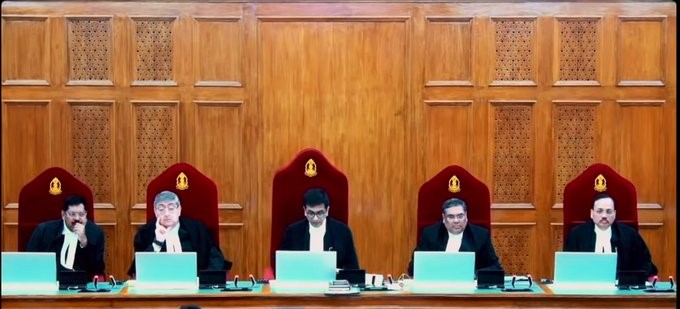New Delhi, Dec. 11: The Article 370 judgement was delivered by a 5-member Constitutional Bench of the Supreme Court headed by the CJI Justice Chandrachud. Chief Justice Chandrachud, Justice Gavai and Justice Surya Kant formed the lead judgment. Justice Sanjay Kishan Kaul concurred, in a separate judgement. Justice Sanjiv Khanna agreed with both opinions. With three judgements delivered, the Supreme Court upheld the abrogation of Article 370, held that J&K had no claim to sovereignty after its accession to India, only “asymmetric federalism” after accession. It also held that the J&K Constitution was redundant and there was no prima facie case that the government’s actions were malafide in any way.
In two judgements, the bench held that the reorganisation of J&K into the Union Territories of J&K and Ladakh was valid but temporary and ordered the Union Government to restore statehood and hold state elections by Sept. 2024 (five months after the Parliamentary elections are to be held tentatively).
Justice SK Kaul held, in a separate but concurring judgement, that there was intergenerational trauma in Kashmir and recommended the setting up of a “Truth and Reconciliation Commission” to investigate cases of human rights violations from 1980 onwards in Jammu & Kashmir and take steps for reconciliation. However, the composition of this and the way forward is left up to the government.
To understand the trajectory and timeline of the Article 370 case, read the Supreme Court Observer’s page on its legal journey.
In a nutshell (via LiveLaw)
- President’s order (CO 273) abrogating the special status of Jammu and Kashmir upheld.
- Article 370 is a temporary provision.
- J&K retained no sovereignty.
- CO 272 (which changed the definition of ‘J&K Constituent Assembly’ as ‘J&K Legislative Assembly’) is invalid. But this is of no consequence since the Court held that the President can declare 370 inoperative even without any recommendation of JK Constituent Assembly.
- The Court did not decide whether the conversion of J&K as State was invalid since the Union undertook to restore the statehood to JK as soon as possible. The Court upholds the creation of Ladakh UT.
- Court directs that elections to the JK Assembly be held by September 30, 2024.
- Justice Kaul recommends that a Truth and Reconciliatory Commission be set up to investigate and report on the human rights violations by both State and non-State actors carried out in Kashmir valley since 1980s.




